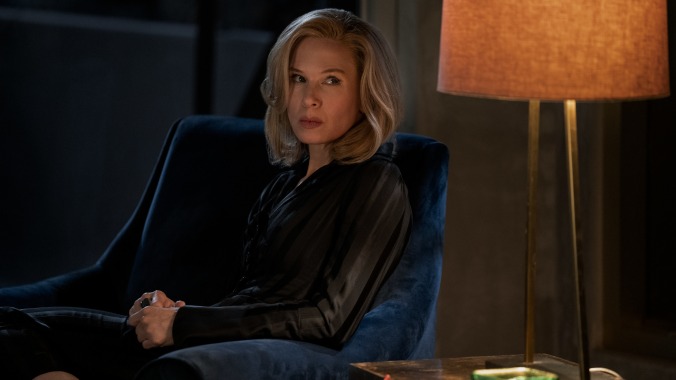As we meet the attractive six young players who primarily function as the pawns of self-described “neo-noir social thriller” Netflix series What/If, they’re playing a Scruples-like game, asking questions like “Would you have sex outside of your relationship?” The game foreshadows the entire series, as all three of the couples will wind up straying in one way or another, for entirely different reasons.
It’s to Zellweger’s credit that her character remains as enigmatic as she does, because she rarely stops talking; the series kicks off with a three-minute monologue spoken into a portable tape recorder (c’mon, not her phone?) railing against “lesser people’s moral agendas,” just in case Anne’s life motto, “At any cost,” didn’t clue you in to what kind of sentiment-less mastermind we’re dealing with here. But her dialogue is delivered in slow, plodding platitudes—you could picture most of her lines on a series of Machiavelli-themed cross-stitched pillows. Honesty, sacrifice, ambition—there isn’t a concept or value that Anne isn’t going to condescendingly over-explain to those unfortunate enough to be trapped in conversation with her. A plethora of silkily unfurled lines like “You can always count on a shiny object to distract the masses,” “People can only take from you as much as you allow,” and “True greatness only comes to those willing to pursue it,” can lead to some teeth-gnashing for the viewer, until you’re snarling, “Shaddap already,” and tossing those cross-stitched pillows at the screen and wondering why these deer-in-the-headlights pawns masquerading as characters give this woman the time of day. What/If creator Mike Kelley also created the similarly soapy Revenge (and Swingtown, for that matter), but whereas Revenge’s calculating lead, Emily Thorne, did have a thing for voice-over, her master plan was much more about showing than telling. Anne is way too much telling.
Unfortunately, the other characters’ dialogue doesn’t fare better by comparison, as their conversations are similarly cloying and heavy-handed. A former yuppie describes a revelatory experience he had on a side of a mountain, explaining, “I didn’t want to make money any more. I wanted to make meaning instead.” Todd enthuses to Sean in a typically unnecessary bit of expository dialogue, “I’ve known you since high school,” though it is unlikely that his longtime pal needs to be reminded of that fact. When Sean runs into a former flame, he admits, “I’ve always had a soft spot for you,” and she painfully responds, “And a hard one, too.” When Marcos explains his life as a public defender to a hot guy at a bar, he sells it as, “Truth, justice, the American way… pretty lame.” “Pretty sexy,” counters the cute but apparently clueless guy. Even Anne purrs that she wants to “start a buzz” about Lisa’s company, a phrase outdated in 2005.
So it’s not Zellweger’s fault: Even the Barrymores couldn’t sell this claptrap. Meanwhile she seems to be having a fine time scenery chomping and indulging in Anne’s favorite hobbies, like fencing, indoor archery, and attacking bonsai trees with scissors. All that, plus chess with her man-servant. Obviously.
If you can get past the thorny, sticky dialogue (a big if), What/If has an interesting premise about ostensibly good people doing bad things. Nearly all the pawns have jobs in which they help people: doctor, medical researcher, firefighters, that long-suffering public defender. But after they lie to their spouses or cover up a crime, where do they land on the good person/bad person spectrum?
What if you do bad things for the right reasons? After all, we’re all faced with moral quandaries just about every day (What if I add extra deductions to my tax return? What if the waitress forgot to charge me for dessert? What if I use an anagram search on Words With Friends?) It’s got to be even harder when some weird blond puppet master is pulling progressively difficult strings that affect your job, your relationship, your life. That’s why What/If’s main bright spot (not Revenge’s Gabriel Mann, who appears much too briefly) is Jane Levy as Lisa. The former Suburgatory lead has the chops to go toe-to-toe with Zellweger, so that her What/If grapplings are actual, interesting battles. It’s almost worth it to keep tuning in to see if Lisa will eventually be able to out-Anne Anne. In the vast majority of the series’ other showdowns, though, the fights are decidedly and predictably one-sided—effectively over before they’ve begun.


 Keep scrolling for more great stories from A.V. Club.
Keep scrolling for more great stories from A.V. Club.